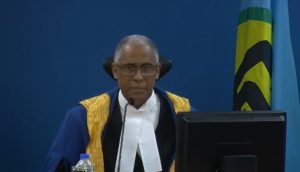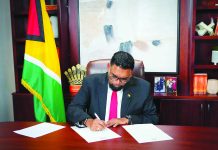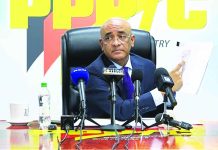
CCJ consequential orders
…APNU/AFC Govt in caretaker mode
…GECOM must comply with Constitution
In bringing finality to the legal proceedings on the consolidated No-Confidence Motion (NCM) cases, the Caribbean Court of Justice (CCJ) on Friday ordered that the APNU/AFC coalition Government resign and call general elections within three months of its June 18 confirmation of the passage of the NCM in the National Assembly, in adherence to the constitutional provisions.
Without naming a date for elections, CCJ President Justice Adrian Saunders insisted that the Constitution is clear and, therefore, the December 21, 2018 passage of the No-Confidence Motion triggered Articles 106 (6) and (7) which lucidly spells out the date.
Article 106 (6) of the Constitution states: “The Cabinet including the President shall resign if the Government is defeated by the vote of a majority of all the elected members of the National Assembly on a vote of confidence”.
Meanwhile, Article 106 (7) states: “Notwithstanding its defeat, the Government shall remain in office and shall hold an election within three months, or such longer period as the National Assembly shall by resolution supported by not less than two-thirds of the votes of all the elected members of the National Assembly determine, and shall resign after the President takes the oath of office following the election”.
According to Justice Saunders, there was no need for the Court to gloss over these provisions but it is in fact the responsibility of the constitutional actors to be faithful to the rule of law and operate within parameters of the Constitution.
“Upon the passage of a vote of no confidence, the Article requires the resignation of the Cabinet including the President. The Article goes on to state, among other things, that notwithstanding its defeat, the Government shall remain in office and that an election shall be held within three months, or such longer period as the National Assembly shall by resolution supported by not less than two-thirds of the votes of all the elected members of the National Assembly determine”.
Furthermore, the CCJ President noted that with the Guyana Elections Commission (GECOM also responsible for the conduction of elections, it, therefore, means that the elections body “too must abide by the provisions of the Constitution”.
He went on to point out that elections should have been held on March 21, 2019 following the December passage of the Opposition-sponsored motion, but that process was on “pause” pending the legal proceedings. That process, he added, however, was no longer on pause following the Court’s June 18, 2019 ruling, which upheld the validity of the NCM, thus, triggering the need for fresh elections. This means that General and Regional Elections would have to be held on or before September 18, 2019, to be consistent with the three months constitutional deadline.
However, Justice Saunders, in delivering the consequential orders, posited that Article 106 outlines the precise timing of when polls should be conducted and, therefore, it would not be right for the Court to issue coercive orders or directives to the actors on how they must act in executing their constitutional responsibilities.
“It is not, for example, the role of the Court to establish a date on or by which the elections must be held or to lay down deadlines or timelines that, in principle, are the preserve of political actors guided by constitutional imperative. The Court must assume that these bodies and personages will exercise their responsibilities with integrity and in keeping with the unambiguous provisions of the Constitution, bearing in mind that the No-Confidence Motion was validly pass as long ago as 21st December, 2018”.
Against this backdrop, nevertheless, the CCJ President outlined the cabinet, including the President, should have already been resigned, thus, reaffirming that the APNU/AFC coalition is, in fact, and should be in a caretaker mode leading up to elections.
“Article 106 envisaged that the tenure in office of the Cabinet, including the President after the Government’s defeat, is on a different footage from that which existed prior to the vote of no confidence…By convention, the Government is expected to behave, during this interim period, as a caretaker and so restrain the exercise of its legal authority. It is this caretaker or interim role that explains the three month deadline in the first instance that the Article lays down in principle for the holding of fresh elections,” Justice Saunders stated.
Furthermore, the Trinidad-based regional Court, in its consequential orders, also awarded costs to Opposition Leader Bharrat Jagdeo and former AFC Member of Parliament Charrandas Persaud, whose vote in favour of the Opposition’s motion caused the coalition Government to topple. The CCJ had ruled that while Persaud was ineligible to sit in the National Assembly because of his dual citizenship status, his vote was nevertheless valid.
Additionally, the Court also ordered that Christopher Ram, who approach the Courts to have the Government uphold the Constitution by resigning and call fresh elections, be paid 60 per cent of his cost.
These costs are to be taxed, if not agreed, and will have to be paid by the Attorney General.











